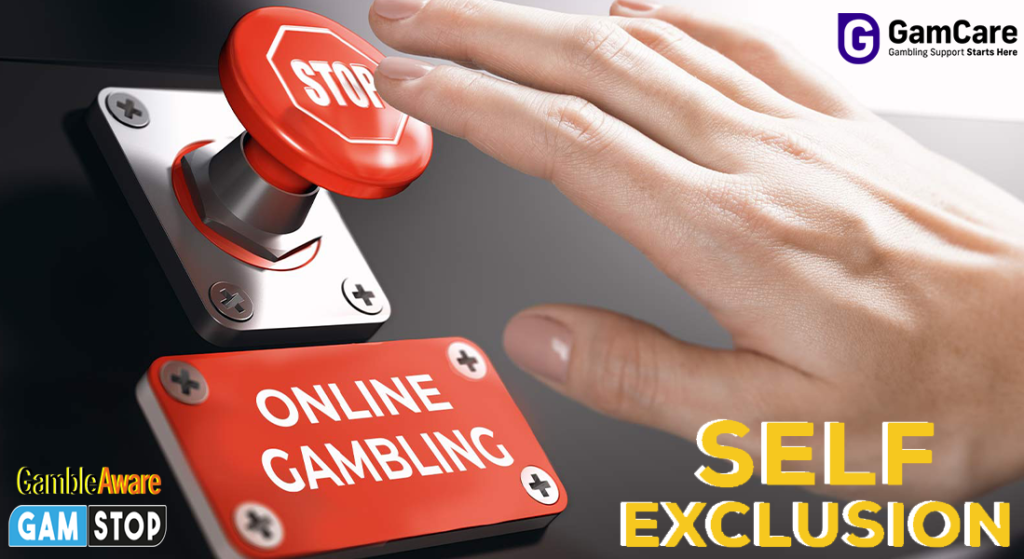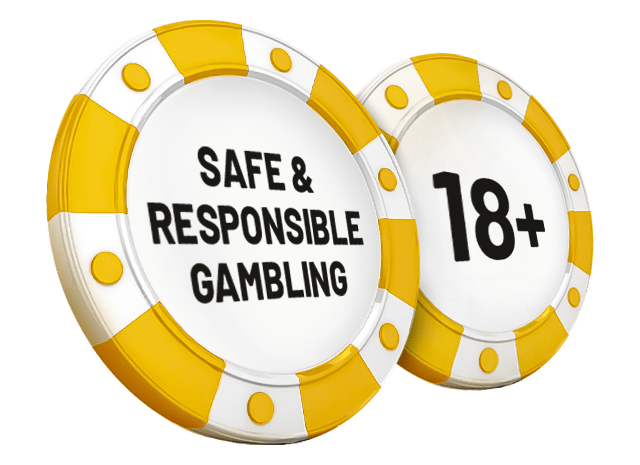Important Steps To Implement Self-Exclusion
Taking control of your gambling habits is essential for maintaining a healthy relationship with online gaming. Self-exclusion is a critical tool for players who feel they need a break from gambling. At Top Casino Games, we emphasize the importance of using self-exclusion as a responsible step toward safeguarding your well-being. By opting for self-exclusion, you can restrict access to your gambling accounts for a set period, helping you avoid any impulse to play during challenging times. This is easy to activate, ensuring you stay in control of your gaming. Self-exclusion is not about quitting—it’s about managing your habits responsibly. Stay smart, stay in control, and enjoy gaming when you're ready!

Introduction to Responsible Gambling & Self-Exclusion
Gambling, in all its forms, has long been a popular pastime enjoyed by millions around the world. Whether it's the thrill of a slot machine, the strategy behind a poker game, or the excitement of placing a sports bet, gambling offers entertainment and an adrenaline rush for players. However, while it can be fun and rewarding, it’s essential to approach gambling with responsibility and awareness. Like any activity involving risk, gambling can have its downsides if not managed properly. This is where the concept of responsible gambling comes into play.

Responsible gambling is about maintaining control over your gambling activities, ensuring that you play for entertainment purposes and within your financial means. Gambling remains a fun and lighthearted hobby, but for some, it can become a problem. When gambling starts to impact personal finances, relationships, or overall well-being, it’s crucial to step back and reassess one’s approach. That’s where self-exclusion, a key tool in responsible gambling, comes into the picture.
What is Responsible Gambling?
Responsible gambling refers to engaging in gambling activities in a way that minimizes harm to the player and their surroundings. It’s about enjoying the thrill and excitement of the games without losing control or letting gambling dominate one’s life. Whether you're playing online or in a physical casino, it’s essential to gamble with a clear understanding of the risks, and always prioritize fun over profit.
To gamble responsibly means setting limits on the time and money spent, knowing when to stop, and never gambling with money that you can’t afford to lose. A key principle of responsible gambling is viewing it as a form of entertainment, not a way to make money or solve financial problems. Many gambling operators offer tools to help players manage their activities, such as deposit limits, cooling-off periods, and detailed tracking of spending.
The Importance of Self-Exclusion
Self-exclusion is one of the most powerful tools available to players who feel their gambling habits are getting out of control. It allows players to voluntarily ban themselves from accessing gambling sites or physical venues for a predetermined period. Self-exclusion is an important step for individuals who recognize that they need a break from gambling, whether to regain control, reflect on their habits, or simply take a breather from the gaming world.
Many online casinos, sportsbooks, and gambling platforms offer self-exclusion as part of their responsible gambling policies. By choosing self-exclusion, players can set timeframes ranging from several days to even years, during which they are blocked from accessing their accounts. This period allows them to focus on other areas of their life, free from the temptation of gambling.
The process is simple: players can usually activate self-exclusion through their gambling account settings or by contacting customer support. Once in effect, players won’t be able to log into their accounts, deposit funds, or place any bets until the self-exclusion period ends. It’s a practical and efficient way to ensure that players stay committed to their decision to take a break.
How Self-Exclusion Works?

The self-exclusion process is designed to be straightforward, ensuring that players can take swift action if they feel it’s necessary. For online platforms, this typically involves logging into your account and selecting a self-exclusion option under the responsible gambling section. Players choose how long they want to be excluded, ranging from a few days to several months or longer, depending on their needs.
Players will be locked out of their accounts for the selected period. During self-exclusion, it’s important to note that most gambling operators will not lift the restriction until the period has elapsed, even if the player has second thoughts. This protects players from acting on impulse and ensures that they take the necessary time to evaluate their relationship with gambling. In some cases, players can extend their self-exclusion periods or even request permanent exclusion if needed.
For physical casinos and betting shops, self-exclusion works similarly. Players need to inform the establishment or governing body, after which they will be banned from entering for a set time. Some countries even have national self-exclusion programs, where players can exclude themselves from all licensed gambling venues in one step.
The Benefits of Responsible Gambling and Self-Exclusion
The primary benefit of responsible gambling and self-exclusion is the protection it offers to players. These tools help individuals avoid developing gambling problems or spiralling into financial distress. By staying in control, players can continue enjoying gambling in a way that is safe, measured, and fun.
For players who feel they’re at risk of developing a gambling problem, self-exclusion offers a proactive step to regain control. It encourages reflection and provides a much-needed pause to reset behaviours. More importantly, it demonstrates a commitment to personal well-being, helping players prevent potential long-term harm.
Moreover, many countries have recognized the importance of responsible gambling, with laws and regulations requiring gambling operators to provide support and self-exclusion options. This widespread adoption emphasizes that gambling can only be enjoyable when it's approached with caution and care.
Responsible gambling and self-exclusion are fundamental components of a healthy gambling experience. By understanding how to set limits and knowing when to take a break, players can enjoy gambling safely and sustainably. The key to a positive gambling experience lies in staying in control and using the tools available to ensure that gambling remains fun and stress-free. Self-exclusion is not about giving up; it’s about staying in charge of your gaming habits and maintaining a balanced approach to a pastime that should always be enjoyed responsibly.

Our Comprehensive Guide to Self-Exclusion

Our Comprehensive Guide to Self-Exclusion: Self-exclusion is an essential part of responsible gambling practices, offering individuals who feel they need to take a step back from gambling an effective tool to regain control over their habits. Gambling can be a fun and exciting activity when done in moderation, but for some, it can become a challenge to keep it under control. For those who struggle to manage their gambling habits, self-exclusion provides a way to take a break from gambling, protecting both financial and emotional well-being.
This guide explains what self-exclusion is, how it works, and the benefits it provides for individuals looking to regulate their gambling habits. We’ll also touch on how to implement self-exclusion, its advantages, and what you can expect during the process.
What Is Self-Exclusion?
Self-exclusion is a voluntary program that allows individuals to temporarily or permanently ban themselves from accessing gambling sites or physical gambling venues. It is a form of personal control that helps prevent further engagement in gambling activities. By enrolling in a self-exclusion program, players are proactively taking responsibility for their gambling behaviour, removing the temptation to gamble during difficult periods.
Self-exclusion can last anywhere from a few days to several years, depending on the player’s preference. The main goal of self-exclusion is to offer a break, allowing individuals to reassess their relationship with gambling, regain control of their behaviour, and focus on other aspects of life. This is especially important for those who feel they are spending too much time or money on gambling or have lost control over their betting habits.

How Does Self-Exclusion Work?
The self-exclusion process is relatively straightforward, but it can differ slightly depending on whether you are using online gambling platforms or visiting physical casinos and betting shops. For online gambling, most platforms offer self-exclusion options directly in the account settings or the responsible gambling section.
Players can choose the duration of the self-exclusion, ranging from a temporary pause of a few days to a longer break of months or even years. Once self-exclusion is activated, the player will be locked out of their account, unable to log in, deposit funds, or participate in any gambling activities during the exclusion period.
In some cases, players can also permanently self-exclude if they believe they will not be able to control their gambling in the long term. If a player opts for permanent self-exclusion, the gambling operator will block their access to the site indefinitely, and they won’t be able to reactivate their account.
For physical gambling venues such as casinos and betting shops, self-exclusion programs work similarly. Individuals need to inform the venue or the appropriate regulatory authority that they wish to be excluded. Many jurisdictions offer a central self-exclusion system that covers all licensed gambling establishments, meaning that a player’s exclusion applies to all venues within that area. Players may also need to provide identification and complete a self-exclusion form, after which they will be banned from entering the establishments for the duration of the exclusion period.
Self-exclusion is easy to access and implement. Here are the steps typically involved in the self-exclusion process:
- Identify the Need for Self-Exclusion: The first step is recognizing that gambling is becoming problematic. Whether it's overspending, excessive time spent gambling, or negative impacts on personal life, identifying the issue is key to taking action.
- Choose a time frame: Decide how long you want to exclude yourself from gambling activities. Many online platforms offer flexible timeframes, such as 24-hour cooling-off periods, weekly breaks, or multi-year exclusions. Consider how long you need to step away from gambling and choose a duration that will allow you to regain control.
- Activate Self-Exclusion: On most gambling websites, the self-exclusion feature can be found under responsible gambling settings. Simply select the exclusion period and confirm your decision. For physical venues, contact the casino or betting shop directly or consult your region's self-exclusion program to submit the necessary forms.
- Stick to the Plan: Once self-exclusion is in place, it’s important to stay committed to your decision. Most gambling operators won’t allow you to cancel self-exclusion early, ensuring that you take the full break without the option to return prematurely.
- Seek Support if Needed: If you feel that gambling is severely affecting your life, it may be helpful to seek professional support. Many responsible gambling programs offer counselling services, and there are various support groups for individuals dealing with gambling addiction.
Benefits of Self-Exclusion
Self-exclusion is a proactive step that offers numerous benefits for those needing a break from gambling. Here are some of the key advantages:
- Immediate Relief from Gambling: Self-exclusion provides immediate relief by cutting off access to gambling platforms and venues. Once activated, there’s no temptation to play, helping individuals regain control over their gambling habits.
- Time to Reflect: The exclusion period allows individuals to take a step back and reflect on their relationship with gambling. It’s an opportunity to focus on other areas of life, such as family, work, and personal well-being, without the distraction or stress of gambling.
- Prevention of Financial Losses: For those spending more than they can afford on gambling, self-exclusion helps prevent further financial strain. By stopping access to gambling, players can safeguard their money and avoid future losses.
- Encourages Healthy Habits: During the exclusion period, players often rediscover other hobbies, interests, and ways to enjoy their free time. This fosters a healthier, more balanced lifestyle, where gambling is no longer the central focus.
- Support for Long-Term Control: For individuals with gambling problems, self-exclusion is a key step in managing their behavior over the long term. By removing the option to gamble, individuals can take control of their actions and seek help to address the underlying issues contributing to their gambling habits.
What to Expect During Self-Exclusion
During self-exclusion, it’s natural to feel a range of emotions, from relief to frustration. At first, it might be difficult to adjust, especially if gambling has been a significant part of your routine. However, the exclusion period is an excellent time to develop new habits and activities that provide fulfilment without the risks associated with gambling.
It’s also a period of growth, where individuals can reflect on their triggers, establish financial stability, and focus on personal well-being. If gambling cravings persist, support from professionals and organizations can be invaluable during this time. Self-exclusion is a powerful tool for anyone who needs a break from gambling. Whether it’s a temporary pause or a long-term commitment, self-exclusion helps players regain control, avoid further harm, and rediscover a balanced and healthy lifestyle. By taking this proactive step, individuals can enjoy the positive aspects of gambling when they’re ready, free from the risks of addiction or financial stress.
The Different Forms of Self-Exclusion

The Different Forms of Exclusion: Self-exclusion is a vital tool for responsible gambling allowing individuals to take control of their gambling habits by voluntarily restricting access to gambling venues, both online and offline. It is designed for people who feel their gambling activities are getting out of hand and need time away to regain control. There are several forms of self-exclusion, each tailored to different types of gambling platforms and environments, offering flexibility for players who want to take a break.
Exclusion can be a temporary or permanent solution and can be enforced across different casino platforms. From online casinos to physical venues, various forms of self-exclusion provide gamblers with the opportunity to take a step back from gambling. This guide explores the different forms of self-exclusion and how they function to support individuals in managing their gambling habits responsibly.
1. Online Casino and Sportsbook Self-Exclusion
In the digital age, online gambling has become one of the most popular ways to place bets, whether it’s on casino games, sports events, or lotteries. With online gambling being highly accessible, it’s easy to get drawn into frequent play. To help manage this, many online casinos and sportsbooks offer built-in self-exclusion features as part of their responsible gambling policies.
When a player opts for self-exclusion on an online platform, they voluntarily block themselves from accessing the site for a specified period. Most platforms allow users to choose the length of their exclusion, ranging from 24-hour cooling-off periods to permanent exclusion. During this time, the player will be unable to log in, deposit funds, or place bets.
Some platforms also allow self-exclusion across multiple online gambling sites if they belong to the same operator or group. Additionally, in regions with regulated gambling markets, centralized systems exist that allow players to exclude themselves from all licensed online gambling operators within that jurisdiction. For instance, the UK’s GAMSTOP system enables players to be excluded from all licensed UK gambling websites with one registration.
2. Land-Based Casino Self-Exclusion
For those who prefer gambling at physical casinos, self-exclusion programs are available at many licensed venues. Land-based casinos allow players to voluntarily exclude themselves from entering the premises for a set period. When a player opts for self-exclusion at a physical casino, they typically register with the venue or the relevant gambling authority, agreeing not to enter the casino or participate in any gaming activities.
Self-exclusion in physical casinos can be done for varying durations, from months to years, and in some cases, permanently. The casino may require the individual to fill out a form, provide identification, and be added to a database to enforce the exclusion. During the exclusion period, if the individual attempts to enter the casino, staff are instructed to deny them entry. In some jurisdictions, violating a self-exclusion agreement can lead to penalties or legal consequences.
Many countries and regions also have centralized self-exclusion programs for physical venues, which cover multiple casinos and betting shops within a specific area. For example, Canada’s Voluntary Self-Exclusion (VSE) program allows individuals to exclude themselves from all casinos in a particular province.
3. Betting Shop and Lottery Self-Exclusion
For individuals who frequent betting shops or purchase lottery tickets in physical outlets, self-exclusion programs are also available. Players can voluntarily exclude themselves from placing bets at betting shops by informing the shop or registering with a responsible gambling program. This form of self-exclusion usually involves signing an agreement to be barred from entering specific betting locations.
In regions with regulated gambling industries, some countries offer centralized systems that cover all betting shops within a certain jurisdiction. For instance, in the UK, Multi-Operator Self-Exclusion Schemes (MOSES) allow players to exclude themselves from multiple betting shops with one registration. This ensures that even if players try to gamble at different locations, they are still prevented from placing bets.
Lottery self-exclusion works similarly. Players can request exclusion from purchasing lottery tickets or scratch cards through both physical outlets and online platforms. Some lotteries offer self-exclusion for online purchases, allowing players to block access to their accounts or disable the ability to buy lottery products.
4. Mobile Gaming App Self-Exclusion
As mobile apps become increasingly popular for gambling, self-exclusion has extended to mobile gaming platforms. Whether it’s playing casino games, poker, or placing sports bets via a mobile app, self-exclusion options are built into most mobile gambling apps, much like their desktop counterparts. Users can activate self-exclusion directly from the app settings.
Similar to online self-exclusion, players using mobile apps can choose how long they want to be excluded. Once self-exclusion is activated, the user will be locked out of the app, and notifications or advertisements related to gambling will typically be disabled to help reduce temptation. The player will not be able to re-access the app until the exclusion period has passed.
5. National and Regional Self-Exclusion Programs
In many countries with regulated gambling industries, national or regional self-exclusion programs have been developed to help protect players across all forms of gambling. These programs allow individuals to self-exclude from multiple types of gambling, including online casinos, land-based venues, and sports betting shops, through a single registration.
For example, in the United States, several states with legal gambling offer self-exclusion programs that cover all licensed casinos and online gambling operators within the state. Similarly, in the European Union, countries like France and Italy have government-regulated self-exclusion systems that protect players from accessing all licensed gambling platforms.
National self-exclusion programs provide a comprehensive safety net, ensuring that even if a player tries to gamble across different platforms, they are blocked from doing so. These programs are especially beneficial for individuals who engage in various types of gambling and want to take a unified approach to self-exclusion.
Self exclusion is a powerful tool for anyone seeking to regain control over their gambling habits. Whether gambling online, in land-based casinos, or at betting shops, there are various forms of exclusion available to help individuals take a break from gambling. By offering flexibility in the exclusion period and covering different types of platforms, self-exclusion ensures that players can choose the option that best suits their needs. With availability of national and regional programs, self-exclusion provides a comprehensive safety net for individuals looking to maintain responsible gambling habits.
Important Steps to Implement Self-Exclusion

Important Steps to Implement Self-Exclusion: Self-exclusion is a valuable tool designed to help individuals regain control over their gambling habits when they feel that gambling has become problematic. It is a proactive step that players can take to voluntarily exclude themselves from gambling activities for a specified period, whether online or in physical venues. Implementing self-exclusion can be life-changing for those struggling with compulsive gambling, and it serves as a key element of responsible gambling practices.
This guide will outline the important steps to implement self-exclusion effectively, ensuring that it is a straightforward process for anyone who needs to take a break from gambling and prevent further financial and emotional harm.
Step 1: Recognize the Need for Self-Exclusion
The first and most crucial step in implementing self-exclusion is recognizing when it is necessary. Gambling should always remain a form of entertainment, but when it begins to impact daily life, relationships, work, or finances, it might be time to consider self-exclusion. Some common signs include gambling beyond your budget, lying about gambling activities, experiencing feelings of guilt or shame, or neglecting other important responsibilities in favour of gambling.
Acknowledging that gambling has become a problem is the first step toward change. Self-exclusion is particularly useful for individuals who find it difficult to control their gambling behaviour and need help stopping or reducing their participation in gambling activities.
Step 2: Choose the Appropriate Duration
Once you have decided to self-exclude, the next step is to choose the appropriate duration of your exclusion. Self-exclusion can range from short-term cooling-off periods, such as 24 hours or a week, to longer periods such as six months, one year, or even a permanent ban. The duration of exclusion depends on your personal needs and the severity of your gambling problem. For individuals who are unsure about the level of control they need, starting with a shorter exclusion period can provide immediate relief, allowing time to reassess the situation.
For those facing more severe gambling issues, longer exclusion periods or even permanent exclusion may be more appropriate. It’s essential to select a timeframe that gives you enough space to break the cycle of gambling and reflect on your habits. Many gambling platforms and venues offer flexible options, allowing you to choose the exclusion period that suits you best.
Step 3: Enroll in an Online Self-Exclusion Program
For online gamblers, most reputable online casinos, sportsbooks, and gambling apps have self-exclusion tools built into their platforms. These tools can be accessed directly from the user account settings, typically under the “Responsible Gambling” or “Self-Exclusion” sections.
To begin the process, log into your account, navigate to the self-exclusion page, and follow the instructions to select your desired exclusion period. Once you confirm your choice, you will be automatically locked out of your account for the specified duration. You will not be able to log in, deposit funds, or engage in any gambling activities during this time. Additionally, many platforms will stop sending promotional emails or ads to reduce the temptation to return to gambling.
In regions with regulated gambling markets, centralized self-exclusion systems such as GAMSTOP in the UK allow players to register for a self-exclusion that applies to all licensed online gambling operators within the jurisdiction, providing comprehensive protection.
Step 4: Implement Self-Exclusion in Physical Venues
For those who prefer land-based gambling, self-exclusion can also be applied in physical casinos, betting shops, and other gambling establishments. To implement self-exclusion in a land-based venue, contact the venue’s management or the appropriate gambling authority, depending on local regulations. You will likely need to fill out a self-exclusion form and provide identification to confirm your request. There are centralized self-exclusion systems that cover all licensed physical gambling venues, meaning that you can exclude yourself from all casinos and betting shops in that jurisdiction with one registration.
For example, in Canada, the Voluntary Self-Exclusion (VSE) program allows individuals to be excluded from all casinos within a province, providing a broader safety net. Once your self-exclusion is activated, you will not be permitted to enter the venue during the exclusion period. If you attempt to enter, security staff will be notified, and in some jurisdictions, attempting to gamble while self-excluded can result in penalties.
Step 5: Stick to the Exclusion Plan
Once self-exclusion is in place, it’s important to remain committed to the plan. Most self-exclusion programs are designed to be non-reversible, meaning that you cannot cancel the exclusion before the time period has ended. This ensures that you take the full break you need from gambling, preventing any spontaneous decisions to return prematurely. During the exclusion period, focus on building healthier habits and spending time on activities that bring positive reinforcement, such as hobbies, socializing with friends, or physical exercise. This time can also be used to seek professional help if needed, through counselling, support groups, or gambling helplines.
Step 6: Seek Additional Support
Self-exclusion is a powerful tool, but for some individuals, it might not be enough on its own. If you find that gambling has severely impacted your life, finances, or relationships, it’s important to seek additional support. Many responsible gambling programs provide access to counselling services, and organizations such as Gamblers Anonymous and GamCare offer support groups and helplines. Having a support network in place can make a significant difference in staying committed to the self-exclusion period and addressing the underlying issues contributing to compulsive gambling.
Implementing self-exclusion is an important step in maintaining responsible gambling practices and regaining control over gambling habits. By recognizing when gambling has become problematic, choosing the appropriate exclusion period, and enrolling in self-exclusion programs, both online and in physical venues, individuals can take proactive measures to protect their financial and emotional well-being. Staying committed to the exclusion plan and seeking additional support if needed ensures that self-exclusion remains an effective tool for long-term control and recovery.

The Effects of Self-Exclusion on Casino Accounts

Immediate Restrictions: Self-exclusion is a critical tool for responsible gambling to help individuals regain control over their gambling activities. It allows players to voluntarily exclude themselves from participating in gambling activities for a predetermined period or permanently. While self-exclusion is primarily aimed at protecting individuals from the potential harms of gambling, it also has significant implications for their casino accounts.
Understanding these effects is crucial for anyone considering self-exclusion, as it impacts various aspects of their online and land-based gaming experience. When a player initiates self-exclusion, the most immediate effect is the restriction of access to their casino account. This applies to both online and physical casino environments. In online casinos, once self-exclusion is activated, the player is locked out of their account for the duration of the exclusion. This means they cannot log in, make deposits, or participate in any gaming activities. Similarly, in physical casinos, self-excluded individuals are barred from entering the premises, which include gaming areas, betting shops, and event venues.
This immediate access restriction serves as a vital cooling-off period, preventing players from engaging in impulsive gambling behaviours. It offers a crucial break from the cycle of gambling, allowing individuals time to reassess their habits and motivations without the risk of instant access to their accounts.
Account Status and Funds
During the self-exclusion period, the status of the player's account can vary depending on the policies of the casino. Most online casinos will keep the account active but locked, meaning that the funds within the account remain intact. Players can usually access their account balance after the exclusion period ends, enabling them to make withdrawals or reactivate their gambling activities if they choose to do so.
However, it is essential to understand the casino’s specific policies regarding account funds during self-exclusion. Some casinos may impose additional fees for maintaining inactive accounts or have specific rules about withdrawing funds while under self-exclusion. Players should thoroughly review the terms and conditions of their chosen casino to understand these implications before enrolling in a self-exclusion program.
In physical casinos, self-excluded individuals often have the right to request the withdrawal of any remaining funds in their player accounts, but they may need to follow specific procedures to do so. The casino staff will typically assist with this process, but the individual needs to be prepared for possible verification steps, such as providing identification.
Communication and Marketing Restrictions
Self-exclusion also affects the way casinos communicate with the excluded individual. Upon self-exclusion, players are generally removed from all marketing and promotional mailing lists. This means they will no longer receive promotional emails, text messages, or advertisements related to gambling activities, helping reduce temptation during the exclusion period.
This communication restriction is crucial for maintaining the integrity of the self-exclusion process. By minimizing exposure to gambling promotions, players are less likely to feel enticed to return to gambling prematurely. Many responsible gambling programs also encourage players to self-exclude from marketing communications proactively, as it helps create a healthier gambling environment.
Reassessment of Gambling Habits
The self-exclusion period serves as an opportunity for reflection and reassessment. Players can use this time to evaluate their gambling behaviours and consider whether they want to return to gambling once the exclusion period ends. This critical phase often leads to a greater understanding of personal triggers, motivations, and the impacts of gambling on their lives.
During self-exclusion, individuals may seek counselling, attend support groups, or engage in activities that promote healthier lifestyles, which can significantly influence their gambling attitudes. As they reassess their relationship with gambling, they may decide to extend their self-exclusion or choose not to return to gambling at all, reflecting a positive outcome from the self-exclusion process.
Long-Term Impacts on Gambling Behavior
The effects of self-exclusion can extend far beyond the immediate access restrictions and account status. For many individuals, completing a self-exclusion period can lead to long-term changes in gambling behaviour. By taking a break and reflecting on their habits, many individuals find that they have developed healthier attitudes towards gambling, resulting in reduced risk-taking behaviours and a more responsible approach to gaming.
Additionally, some jurisdictions offer support services and programs that can help individuals maintain their commitment to responsible gambling after the selfexclusion period ends. These resources may include access to counselling, support groups, or educational materials on responsible gambling practices. Such services can be invaluable for helping individuals navigate their return to gambling, should they choose to do so.
Self exclusion is a powerful tool that provides individuals with the opportunity to take a break from gambling and regain control over their habits. The effects of self-exclusion on casino accounts are multifaceted, involving immediate access restrictions, communication limitations, and long-term impacts on gambling behaviour. By understanding these effects, individuals can make informed decisions about their gambling habits and utilize self-exclusion effectively as part of a responsible gambling strategy. Whether a player chooses to return to gambling after the exclusion period or opts for permanent self-exclusion, the process is an essential step in promoting a healthier relationship with gambling activities.
Managing Your Funds After Self-Exclusion

Self-exclusion is a proactive measure that individuals can take to mitigate the risks associated with problem gambling. It allows players to voluntarily ban themselves from participating in gambling activities for a specific period or indefinitely. While the primary goal of self exclusion is to promote responsible gambling and provide individuals with a break from potentially harmful behaviours, it also raises important considerations regarding the management of funds in their gambling accounts. Understanding how to manage these funds after self-exclusion is crucial for individuals looking to regain control over their finances and gambling habits.
Understanding the Financial Implications
After self-exclusion, individuals may find themselves in a unique financial situation. While their accounts remain intact, access to those funds is restricted during the exclusion period. Players must recognize the importance of understanding their financial standing about their gambling activities. This includes knowing the balance in their accounts, the availability of funds for withdrawal, and any potential fees or penalties imposed by the gambling operator. For many, self-exclusion can also serve as a wake-up call regarding the amount of money they have spent on gambling.
Acknowledging past spending habits is essential for developing a more responsible approach to finances in the future. Reflecting on previous gambling behaviours can lead to better decision-making when it comes to managing funds, whether the individual chooses to return to gambling after the exclusion period or not.
Withdrawing Funds During Self Exclusion
One of the first steps to consider after self-exclusion is whether to withdraw any remaining funds from the gambling account. Most casinos, both online and land-based, allow self-excluded players to withdraw their balances. However, the process can vary depending on the casino's policies. In online casinos, players typically have the option to request a withdrawal through the account settings.
It’s essential to follow the casino’s withdrawal procedures, which may require identity verification to ensure compliance with responsible gambling practices. This step not only helps to secure the funds but also provides an opportunity for reflection on the reasons for self-exclusion. In physical casinos, individuals can approach the customer service desk to request a withdrawal. They may need to provide identification and fill out a form to initiate the withdrawal process. It's advisable to inquire about any associated fees or restrictions during the withdrawal to avoid unexpected charges.
Developing a Budget
After self-exclusion, individuals should focus on establishing a budget that reflects their financial goals and responsibilities. Creating a budget helps in managing funds effectively, ensuring that essential expenses are prioritized over discretionary spending, including gambling. When developing a budget, it is crucial to:
- Assess Income and Expenses: List all sources of income and regular expenses, including rent, bills, groceries, and other necessities. This will provide a clear picture of financial obligations.
- Set Financial Goals: Identify short-term and long-term financial goals, such as saving for a vacation, paying off debt, or building an emergency fund. Having specific goals in mind can motivate individuals to stick to their budget.
- Allocate Funds Wisely: Distribute income into various categories, ensuring that enough money is set aside for savings and essential expenses. Consider setting a specific amount for entertainment, which can include leisure activities that are not gambling-related.
Seeking Support and Resources
Managing funds after self-exclusion can be challenging, especially for those who may have developed problematic gambling habits. Seeking support from friends, family, or professional counsellors can provide individuals with valuable guidance and encouragement in their financial journey.
There are also numerous resources available for individuals looking to manage their finances after self-exclusion. Financial literacy programs, budgeting apps, and online forums can offer insights into effective money management strategies. Connecting with support groups focused on gambling addiction can provide a sense of community and accountability, helping individuals stay committed to their goals.
Reflecting on Gambling Habits
Another essential aspect of managing funds after self-exclusion is reflecting on past gambling habits. Understanding the triggers that led to excessive gambling can provide valuable insights for future decision-making. This reflection might involve journaling, seeking counselling, or participating in support groups.
By identifying triggers—whether they are emotional, social, or situational—individuals can develop coping strategies to avoid similar situations in the future. For instance, if social gatherings were a trigger for gambling, one might consider setting boundaries or opting for different types of social activities that do not involve gambling.
Managing funds after self-exclusion is a critical component of regaining control over one’s gambling habits and overall financial health. By understanding the financial implications, withdrawing funds responsibly, developing a budget, seeking support, and reflecting on past behaviours, individuals can navigate the challenges of self-exclusion more effectively. This process not only enhances financial literacy but also fosters a healthier relationship with gambling, enabling individuals to make informed decisions about their entertainment choices in the future. Through these efforts, individuals can take significant steps toward achieving financial stability and personal growth while prioritizing responsible gambling practices.
Online Casino Responsible Gaming Tools

In the world of online gambling, responsible gaming has become a central focus for both operators and players. The best and most trustworthy online casinos recognize the importance of providing players with tools and resources to ensure that their gaming experiences remain enjoyable, safe, and within their control.
These responsible gaming tools are designed to help players make informed decisions, manage their gambling activities, and identify any potential issues before they escalate. Let´s learn the various responsible gaming tools that top online casinos offer, empowering players to engage in gambling more healthily and responsibly.
Account Limitations
One of the primary responsible gaming tools available at reputable online casinos is account limitations. Players can set personal limits on their gambling activities, including deposit limits, betting limits, and loss limits. This feature empowers players to manage their finances effectively and avoid overspending. For example, a player might set a deposit limit to ensure that they only gamble a specific amount each week or month. By doing so, they can maintain control over their gambling budget and prevent impulsive decisions that could lead to significant financial consequences.
Time-Out Options
Time-out options allow players to take a temporary break from gambling without fully self-excluding themselves. This feature is particularly beneficial for individuals who recognize that they may be gambling too frequently or for extended periods. Players can choose a time-out duration ranging from a few hours to several days, during which their accounts are suspended, and they cannot access gambling activities. This cooling-off period helps players regain perspective, reassess their gambling habits, and return to the gaming experience with a refreshed mindset.
Self Exclusion Programs
Self exclusion programs offer a more long-term solution for individuals who need a break from gambling. Players can voluntarily exclude themselves from an online casino for a specified period, ranging from months to years. During this time, they are unable to access their accounts or engage in any gambling activities. This tool is vital for those who recognize that their gambling habits are problematic and wish to take a significant step back. Many reputable online casinos partner with local gambling authorities to ensure that self-exclusion is enforced across multiple platforms, providing a comprehensive approach to responsible gaming.
Reality Checks
Reality checks are another essential feature offered by trustworthy online casinos. This tool serves as a reminder to players about the time they have spent gambling. Players can set up periodic notifications that alert them after a predetermined amount of time has passed. This feature encourages players to take breaks and evaluate their gaming activities. By prompting players to reflect on their time spent gambling, reality checks help prevent extended gaming sessions that can lead to fatigue, poor decision-making, and overspending.
Deposit and Withdrawal Limits
In addition to setting deposit limits, many online casinos also allow players to establish withdrawal limits. This feature can be particularly beneficial for those who may find it challenging to control their gambling behavior. By setting a limit on the amount of money they can withdraw within a certain timeframe, players can create an additional layer of financial management. This helps ensure that any winnings are not quickly lost due to impulsive betting.
Educational Resources
The best online casinos prioritize player education by providing comprehensive resources on responsible gambling. This may include articles, guides, and videos that explain the principles of responsible gaming, the risks associated with gambling, and how to recognize problem gambling behaviours. Additionally, reputable casinos often feature links to external support organizations, such as Gamblers Anonymous or national gambling helplines, where players can find additional assistance and counselling if needed.
Gamification of Responsible Gambling
Some innovative online casinos are incorporating gamification into their responsible gaming tools. This approach makes responsible gambling more engaging and interactive. For example, casinos may offer rewards or achievements for players who successfully manage their gambling activities, complete educational modules, or utilize responsible gaming features. By integrating gamification, online casinos encourage players to take an active role in their gambling habits while making the process enjoyable.
Support and Customer Service
Reputable online casinos recognize the importance of support for players who may have questions or concerns regarding responsible gaming. Many provide dedicated customer service teams trained to handle responsible gambling inquiries. Players can reach out via live chat, email, or phone to discuss their options or seek guidance on using responsible gaming tools effectively. This level of support demonstrates a casino's commitment to fostering a safe gaming environment.
As the online gambling industry continues to grow, the emphasis on responsible gaming remains paramount. The best and most trustworthy online casinos prioritize player safety and well-being by offering a range of responsible gaming tools designed to keep gambling fun and controlled. From account limitations and time-out options to self-exclusion programs and educational resources, these features empower players to engage in gambling responsibly.
By promoting awareness, providing support, and encouraging healthy habits, reputable online casinos create an environment where players can enjoy their gaming experiences without compromising their financial or emotional well-being. Ultimately, responsible gaming tools not only benefit players but also contribute to a more sustainable and ethical gambling landscape, fostering trust and loyalty within the industry.
Self-Exclusion vs. Account Closure

Gambling can be a source of entertainment for many, but for some, it can lead to problematic behaviours that require intervention. To help individuals regain control over their gambling habits, two key strategies are commonly employed: self-exclusion and account closure. While both serve the purpose of restricting access to gambling activities, they have distinct differences in terms of implications, processes, and long-term consequences. Understanding these differences is crucial for anyone considering these options as part of their responsible gambling journey.
What Is Self-Exclusion?
Self-exclusion is a voluntary and proactive measure that allows individuals to ban themselves from participating in gambling activities for a predetermined period or indefinitely. This option is available at most online casinos and physical gambling establishments. The self-exclusion process usually involves a few simple steps, such as submitting a request through the casino’s website or speaking with a customer service representative in person.
Upon activation, self-exclusion restricts the individual’s access to their gambling account, preventing them from logging in, making deposits, or engaging in any gaming activities. The length of the self-exclusion period can vary, with options typically ranging from a few months to several years, depending on the individual’s needs and the casino’s policies.
One of the primary benefits of self-exclusion is that it provides a cooling-off period for individuals to reflect on their gambling behaviours and assess their motivations. During this time, individuals are often removed from promotional mailing lists and advertisements, reducing the likelihood of being tempted to gamble. Additionally, self-exclusion can foster self-awareness and encourage individuals to seek help if they feel they need it.

What Is Account Closure?
Account closure, on the other hand, is a more permanent action that involves completely terminating an individual’s gambling account with a casino. When a player chooses to close their account, they effectively end their relationship with the casino, meaning they will no longer have access to any of the features, games, or funds associated with that account. This option may be pursued by individuals who have recognized that gambling has become problematic for them and prefer a definitive solution.
The account closure process usually requires the individual to submit a formal request to the casino, which may involve providing identification or other verification details. Once the request is approved, the account will be closed, and the player will lose access to their funds. In some cases, casinos may have policies that require players to withdraw their remaining balances before closing the account, while in others, the funds may be forfeited.
Key Differences Between Self-Exclusion and Account Closure
The primary difference between self-exclusion and account closure lies in their intended outcomes and long-term implications. Self-exclusion is designed as a temporary measure that allows individuals to take a break from gambling while retaining the option to return in the future. This approach can be beneficial for those who recognize they need time away from gambling but do not wish to sever all ties with the activity permanently.
Account closure is a permanent decision that signifies an individual’s intention to eliminate gambling from their life altogether. This step can be liberating, as it removes the temptation to gamble entirely. However, it may also come with feelings of loss or regret, particularly for those who have enjoyed gambling as a form of entertainment in the past.
Emotional and Psychological Considerations
The emotional and psychological aspects of self-exclusion and account closure can also differ significantly. Self-exclusion may evoke a sense of relief for individuals who feel overwhelmed by their gambling behaviours, as it provides a structured opportunity to step back and reassess their habits. During this time, individuals may engage in reflection, counselling, or support groups to address underlying issues related to their gambling. In contrast, account closure may trigger a range of emotions, from relief to sadness.
While closing an account can mark the end of a problematic relationship with gambling, individuals may mourn the loss of an activity they once enjoyed. It’s essential for those who choose account closure to have support systems in place to navigate these feelings and adjust to life without gambling.
Reopening Accounts vs. Returning to Gambling
Another critical difference lies in the ability to return to gambling activities. With self-exclusion, once the exclusion period ends, individuals can choose to reactivate their accounts, allowing them to return to gambling if they feel prepared to do so responsibly. This option can be appealing to those who have made significant progress in their journey toward responsible gambling and wish to reintegrate gambling into their lives in a controlled manner.
In contrast, once an account is closed, it typically cannot be reopened. Individuals who have closed their accounts must create new accounts with the same or different casinos, which may involve going through the verification process again. For many, this barrier can serve as a safeguard against returning to problematic gambling behaviours, reinforcing the commitment to recovery.
In summary, self-exclusion and account closure are two distinct strategies for managing gambling behaviours. Self-exclusion offers a temporary break from gambling while allowing individuals to retain the option to return, whereas account closure signifies a permanent end to the gambling relationship. Understanding these differences is crucial for individuals navigating their gambling journeys, as each option presents unique implications, emotional responses, and potential outcomes. Whether choosing self-exclusion or account closure, individuals can take proactive steps toward fostering responsible gambling habits and reclaiming control over their lives.

Global Self-Exclusion Support Resources
Gambling can be a source of enjoyment for many, but for some, it can lead to problematic behaviours that negatively impact their lives and the lives of those around them. To combat these issues, self-exclusion programs have emerged as effective tools for individuals seeking to regain control over their gambling habits. While self-exclusion is often managed at the level of individual casinos or jurisdictions, there are various global resources available to support individuals during this process. This article will explore the different types of self-exclusion support resources available worldwide and how they can help individuals in their journey toward responsible gambling.
National and Regional Self-Exclusion Programs
Many countries have established national or regional self-exclusion programs that enable individuals to voluntarily exclude themselves from gambling activities across multiple operators. These programs are typically managed by government agencies or gambling commissions, and they aim to provide a comprehensive framework for individuals looking to control their gambling behaviours.
In the United Kingdom, for example, the National Self-Exclusion Scheme (NSES) allows players to exclude themselves from all participating online and land-based gambling establishments. The program is administered by the National Gambling Helpline and offers resources and support for individuals considering self-exclusion. Players can register online, and the self-exclusion lasts for a minimum of six months, during which they will receive information on responsible gambling and support services.
Similarly, in Australia, various states and territories have implemented self-exclusion schemes that enable individuals to ban themselves from gambling venues and online platforms. These programs often include support services, educational resources, and counselling options to help individuals manage their gambling behaviours effectively.
Local Support Groups and Counseling Services
In addition to national programs, local support groups and counselling services play a crucial role in providing assistance to individuals struggling with gambling issues. Many non-profit organizations offer resources such as support groups, one-on-one counselling, and educational workshops focused on gambling addiction and recovery.
For instance, Gamblers Anonymous (GA) is a worldwide organization that provides a supportive community for individuals seeking to overcome gambling addiction. With local chapters across the globe, GA offers regular meetings where individuals can share their experiences, gain insights from others, and build a support network. This communal approach fosters accountability and helps individuals feel less isolated in their struggles.
In the United States, organizations like the National Council on Problem Gambling (NCPG) provide resources for individuals and families affected by problem gambling. The NCPG operates a helpline and offers a variety of materials focused on self-exclusion, responsible gambling, and recovery. Local affiliates of the NCPG often organize support groups and counselling services tailored to the needs of their communities.
Online Resources and Helplines
The digital age has made it easier for individuals to access information and support related to gambling issues. Many organizations have developed online platforms that offer valuable resources, including self-exclusion tools, educational materials, and virtual support communities.
The Gambling Therapy website, for example, provides a wealth of information on gambling addiction and offers online support groups and forums where individuals can connect with others facing similar challenges. Their services are available in multiple languages, making them accessible to a global audience. Furthermore, Gambling Therapy offers live support through trained counsellors, providing immediate assistance to those in need.
Another important resource is the Responsible Gambling Council (RGC), which operates in several countries and focuses on preventing problem gambling through education and awareness initiatives. The RGC provides resources for self-exclusion, along with tools for assessing gambling habits and identifying problematic behaviours. Their website also includes a directory of local support services and helplines.
Educational Initiatives and Awareness Campaigns
Education is a vital component of any self-exclusion support system. Many organizations are dedicated to raising awareness about gambling addiction and promoting responsible gambling practices. These initiatives often include public awareness campaigns, community outreach programs, and educational workshops.
For instance, in Canada, the Responsible Gambling Council runs campaigns aimed at educating the public about the risks associated with gambling and the importance of self-exclusion. They provide resources for individuals considering self-exclusion, along with information on how to recognize the signs of problem gambling.
In the UK, the Gambling Commission also emphasizes the importance of education and prevention through its licensing conditions. Operators are required to provide information on responsible gambling and self-exclusion options, ensuring that players have access to the necessary resources to make informed decisions.
Global self-exclusion support resources play a crucial role in helping individuals manage their gambling behaviors and regain control over their lives. From national self-exclusion programs to local support groups and online resources, individuals have access to a wealth of information and assistance tailored to their needs. By leveraging these resources, individuals can take proactive steps toward responsible gambling and recovery, fostering healthier relationships with gambling activities. As awareness of problem gambling continues to grow, the availability of support resources will likely expand, providing even more individuals with the tools they need to navigate their gambling journeys effectively.
Our Final Thoughts & Final Words

Self-exclusion is a critical tool for individuals seeking to regain control over their gambling behaviours. It represents a conscious decision to step back from gambling activities, allowing individuals the necessary time and space to reflect on their habits and the potential consequences of their actions. This practice not only serves as a means of preventing further financial harm but also as an opportunity for personal growth and recovery. As we delve into the significance of self-exclusion, it becomes evident that this strategy can foster healthier relationships with gambling and contribute to overall well-being.
The core purpose of self-exclusion is to empower individuals. By actively choosing to exclude themselves from gambling venues and online platforms, players take a proactive step in addressing their gambling habits. This empowerment is essential, as it shifts the responsibility for managing gambling behaviours back to the individual. Many people find themselves in situations where gambling becomes compulsive, leading to a cycle of regret and financial strain. Self-exclusion breaks this cycle, creating a buffer against the impulsive decisions that can arise in moments of temptation. It is a formal acknowledgement that, at times, stepping away is the healthiest option.
Moreover, self-exclusion provides individuals with the necessary time to assess their relationship with gambling. During the exclusion period, players are often encouraged to engage in reflection, therapy, or support group activities. This period can serve as an essential moment for self-discovery, allowing individuals to identify triggers that lead to problematic gambling behaviour. Understanding these triggers can pave the way for developing coping strategies and healthier alternatives to gambling. It can also promote a deeper understanding of the underlying issues that may contribute to gambling addiction, such as stress, anxiety, or social pressures. As individuals confront these challenges, they can begin to create a more balanced lifestyle, reducing their reliance on gambling as a source of escape or entertainment.
The emotional aspect of self-exclusion cannot be understated. For many, the decision to self-exclude is accompanied by a range of emotions, including relief, sadness, and uncertainty. While some may feel liberated by the choice, others might experience feelings of loss, especially if gambling was a significant aspect of their social lives or personal identity. Acknowledging and processing these emotions is crucial for individuals on their journey toward recovery. It is vital to understand that these feelings are normal and part of the healing process. Support systems, whether through friends, family, or professional counsellors, can be invaluable during this time, providing encouragement and understanding as individuals navigate their new realities.
Another essential aspect of self-exclusion is its impact on financial management. Many individuals struggling with gambling addiction find themselves in precarious financial situations. By self-excluding, players can take the time to re-evaluate their financial habits, create budgets, and explore healthier financial practices. This opportunity for financial reflection can help individuals regain control over their finances, fostering a sense of empowerment that extends beyond the gambling context. As they develop better financial management skills, individuals can rebuild their financial stability, which further enhances their overall well-being.
Self-exclusion also plays a role in raising awareness about responsible gambling practices. Many jurisdictions and gambling operators are increasingly recognizing the importance of promoting self-exclusion programs and ensuring that players are informed about their options. This shift is indicative of a broader societal acknowledgement of gambling addiction as a serious issue that requires attention and support. By fostering a culture of responsible gambling, communities can work together to reduce the stigma surrounding gambling addiction and promote healthier habits.
Self exclusion is a powerful tool that enables individuals to take control of their gambling behaviours and make informed decisions about their participation in gambling activities. It offers a pathway to empowerment, self-reflection, and personal growth. The journey through self-exclusion may be challenging, and filled with emotional highs and lows, but it ultimately serves as a stepping stone toward recovery and a healthier lifestyle. As more individuals embrace self-exclusion and the resources available to support them, the likelihood of fostering a culture of responsible gambling continues to grow.
This commitment to self-awareness and accountability not only benefits individuals but also contributes to healthier communities where gambling can be enjoyed responsibly, free from the shadows of addiction. Through self-exclusion, individuals can reclaim their lives, paving the way for brighter futures and healthier relationships with gambling.
The Most Frequently Asked Questions
Q: What is self-exclusion?
A: Self-exclusion is a voluntary process that allows individuals to ban themselves from participating in gambling activities, either at specific venues or across multiple gambling platforms, for a designated period or indefinitely.
Q: Who can benefit from self-exclusion?
A: Self-exclusion is beneficial for anyone who feels that their gambling habits are becoming problematic or uncontrollable. It is designed for individuals who recognize the need to take a break from gambling to regain control over their behaviours.
Q: How does self-exclusion work?
A: Individuals typically request self-exclusion through a gambling operator’s website or customer service. Once registered, they are barred from accessing their accounts and gambling activities for the specified exclusion period.
Q: Is self-exclusion permanent?
A: No, self-exclusion is not permanent unless the individual chooses it to be. Many programs offer varying lengths of exclusion, ranging from a few months to several years, after which individuals can decide whether to return to gambling.
Q: Can I still access my funds during self-exclusion?
A: In most cases, individuals are required to withdraw any remaining funds in their gambling accounts before self-excluding. Once self-exclusion is in effect, they typically cannot access their accounts or funds.
Q: How long does the self-exclusion process take?
A: The self-exclusion process can be immediate, with individuals often able to self-exclude instantly online or via a phone call. The length of the exclusion itself can vary based on the individual’s needs and the policies of the gambling operator.
Q: Will I receive promotional materials during self-exclusion?
A: No, most self-exclusion programs remove individuals from promotional mailing lists and advertising. This helps reduce temptation during the exclusion period.
Q: What should I do if I feel tempted to gamble while self-excluded?
A: It’s important to seek support during times of temptation. Reach out to friends, family, or a support group to discuss your feelings. Many organizations also offer counseling services for individuals facing these challenges.
Q: Can I self-exclude from multiple gambling sites?
A: Yes, many jurisdictions offer programs that allow individuals to self-exclude from multiple gambling platforms simultaneously. This helps ensure a comprehensive approach to managing gambling habits.
Q: Are there any costs associated with self-exclusion?
A: No, self-exclusion is typically a free service offered by gambling operators and responsible gambling organizations. There should be no fees associated with the self-exclusion process.
Q: What if I change my mind during the self-exclusion period?
A: Most programs have a cooling-off period, during which individuals cannot reverse their self-exclusion. After the designated period ends, individuals can choose to reactivate their accounts if they feel ready to gamble responsibly.
Q: What resources are available to support me during self-exclusion?
A: Numerous resources exist, including local support groups, helplines, counseling services, and online forums. Organizations like Gamblers Anonymous and the National Council on Problem Gambling offer valuable support and guidance.
Q: Does self-exclusion apply only to online gambling?
A: No, self-exclusion applies to both online and land-based gambling establishments. Many jurisdictions have self-exclusion programs that encompass all forms of gambling.
Q: How can I find out more about self-exclusion in my area?
A: You can visit the website of your local gambling commission or regulatory body. They often provide detailed information about self-exclusion programs available in your jurisdiction, including how to enrol.
Q: What happens after the self-exclusion period ends?
A: After the self-exclusion period ends, individuals may choose to reactivate their gambling accounts. It is advisable to assess one’s readiness to return to gambling and consider ongoing support or responsible gambling measures.
























